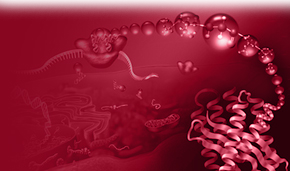|
|

|
|
Science Sparks @ ACTREC
|
 25th October 2021 25th October 2021
|
Vol. No. 10; Issue No. 498 |
|
|
Publications
|
|
1. Kapoor A, Noronha V, Shetty OA, Kashyap L, Kumar A, Chandrani P, Patil VM, Joshi A, Menon N, Kumar R, Pragya R, Prabhash K(2021). Concurrent EGFR and PIK3CA mutations in non-small-cell lung cancer. Cancer Research Statistics Treatment. 4: 541-6.
2. Singh AG, Chaturvedi P (2021). Healing the healers. Cancer Research Statistics and Treatment. 4: 533-5.
3. Dhumal SB, Patil A, More A, Kamtalwar S, Gosavi A, Chandak M, Khattry N, Gupta S, Bhat P (2021). COVID-19 vaccine-related skin rash: A case report. Cancer Research Statistics and Treatment. 4:555-6.
4. Pimple S, Mishra G (2021). Pitfalls of generalizing the causes of COVID-19 vaccine hesitancy among patients with cancer. Cancer Research Statistics and Treatment 4:566-7.
5. Pimple S, Mishra G (2021). Need for a national consortium of clinical registries of cancer and COVID-19 for vaccine surveillance. Cancer Research Statistics and Treatment. 4: 570-1.
6. Spampinato AS Jensen N, Pötter R, Fokdal L, Chargari C, Lindegaard J, Schmid M, Sturdza A, Ina M. Schulz J, Mahantshetty U, Hoskin P, Segedin B, Rai B, Bruheim K, Wiebe E, Steen-Banasik E, Cooper R, Limbergen E, Sundset M, Pieters B, Lutgens L, Tan L, Villafranca E, Smet S, Jastaniyah N, Nout R, Kirisits C, Chopra S, Kirchheiner K, Tanderup K (2021). EMBRACE Collaborative Group. Severity and persistency of late gastrointestinal morbidity in locally advanced cervical cancer: lessons learned from EMBRACE-I and implications for the future. International Journal of Radiation Oncology Biology Physics.
7. Dani MT, Singh AG, Chaturvedi P (2021). COVID-19 vaccine hesitancy in India. Cancer Research, Statistics and Treatment. 4:437-42
8. Sriram H, Khanka T, Kedia S, Tyagi P, Ghogale S, Deshpande N, Chatterjee G, Rajpal S, Patkar NV, Subramanian PG, Gujral S, Hasan S, Tembhare PR. Improved protocol for plasma microRNA extraction and comparison of commercial kits. Biochemia Medica. 31(3): 030705.
9. Barreto SG, Gardi N, Dutt S (2021). Birth of a solid organ cancer-the cell fusion hypothesis presented with pancreatic cancer as a model: a narrative review. Chinease Clinical Oncology.
|
|
|
|
|
Interesting Reads
|
|
Tulstrup M, Soerensen M, Hansen JW, Gillberg L, Needhamsen M, Kaastrup K, Helin K, Christensen K, Weischenfeldt J, Grønbæk K. TET2 mutations are associated with hypermethylation at key regulatory enhancers in normal and malignant hematopoiesis. Nat Commun. 12(1): 6061, 2021.
|
|
|
Legends of Science
|

|
Satyesh Chandra Prakashi
Satyesh Chandra Prakashi obtained his Ph.D. degree from the University of Kolkata in 1954. He worked on the structures of tetraphyllicin, ajmalidine. He synthesized C14 incorporated Benz (a) pyrene, a well known carcinogen, and studied the application of its metabolites. His significant work was on the structure elucidation of the Rauwolfia alkaloid-yohimbine being the basis of the stereo-chemical assignment of the well known tranquilizing drug, reserpine. He pioneered in application of physical methods, such as mass spectrometry, for the structure elucidation of minor alkaloids. He served as the Director, IICB, Kolkata. He was the Founder President of Professor Asima Chatterjee Foundation of Kolkata. Dr. Prakashi was the recipient of the Basudev Memorial Award of the Indian Chemical Society, Kolkata, in 1967.
|
|
| |

|
Amar Nath Maitra
Amar Nath Maitra obtained his Ph.D. degree from the Jadavpur University, Kolkata, in 1971. His area of research was the structure and kinetics of microemulsions. He worked on nanomaterials, mainly gamma ferric oxides, barium ferrite nanocrystals, silver halides, etc. His significant research contribution was on polymeric and inorganic nanoparticles for drug delivery and gene delivery. He has six patents in his name. He was a visiting Professor at the University of Lund; the University of Basel, and Florida; Honorary Advisor for the MTech Course on Nanoscience and Nanotechnology at the University of Delhi.
|
|
| |
|
|
Do You Know?
In 1996, FDA approved anastrozole (Arimidex) as a treatment for breast cancer. This drug blocks the production of estrogen.
|

|
|
|
Cancer News
|
| |
|
Targeting cancer at the nanoscale
|
|
19 October 2021, ScienceDaily
|
|
Researchers fabricate gold nanoparticles with a rapidly decaying radioisotope that can be internalized by cancer cells. Because the radiation remains strongly localized, high doses can be administered without concern for side effects. This research may lead to safer and more effective treatments for many types of cancer...
|
|
|
| |
|
|
|
|
|
|
| |
|
Artificial intelligence spots anomalies in medical images
|
|
21 October 2021, EurekAlert
|
|
Scientists from Skoltech, Philips Research, and Goethe University Frankfurt have trained a neural network to detect anomalies in medical images to assist physicians in sifting through countless scans in search of pathologies...
|
|
|
|
|
© 2021 Advanced Centre for Treatment, Research and Education in Cancer (ACTREC)
|
|
